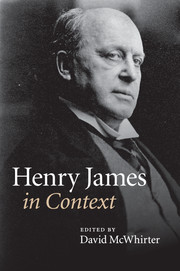Book contents
- Frontmatter
- Contents
- List of Illustrations
- Notes on Contributors
- Preface
- Abbreviations
- Chronology
- Part One Life and career, times and places
- Part Two Historical and cultural contexts
- Chapter 9 Aestheticism and Decadence
- Chapter 10 Authorship
- Chapter 11 Children
- Chapter 12 Consumer culture
- Chapter 13 Cosmopolitanism
- Chapter 14 Courtship, marriage, family
- Chapter 15 Ethics
- Chapter 16 Language
- Chapter 17 Law
- Chapter 18 Manners
- Chapter 19 Media and communication technologies
- Chapter 20 Modernism
- Chapter 21 Money and class
- Chapter 22 Museums and exhibitions
- Chapter 23 Nationalism and imperialism
- Chapter 24 Print culture
- Chapter 25 Psychology
- Chapter 26 Race
- Chapter 27 Realism and naturalism
- Chapter 28 Sexualities and sexology
- Chapter 29 Social sciences and the disciplines
- Chapter 30 Things
- Chapter 31 Time
- Chapter 32 Travel and tourism
- Chapter 33 Urbanity
- Chapter 34 Visual culture
- Chapter 35 Women and men
- Chapter 36 Work
- Part Three Reception
- Further reading
- Index
- References
Chapter 20 - Modernism
Published online by Cambridge University Press: 05 August 2014
- Frontmatter
- Contents
- List of Illustrations
- Notes on Contributors
- Preface
- Abbreviations
- Chronology
- Part One Life and career, times and places
- Part Two Historical and cultural contexts
- Chapter 9 Aestheticism and Decadence
- Chapter 10 Authorship
- Chapter 11 Children
- Chapter 12 Consumer culture
- Chapter 13 Cosmopolitanism
- Chapter 14 Courtship, marriage, family
- Chapter 15 Ethics
- Chapter 16 Language
- Chapter 17 Law
- Chapter 18 Manners
- Chapter 19 Media and communication technologies
- Chapter 20 Modernism
- Chapter 21 Money and class
- Chapter 22 Museums and exhibitions
- Chapter 23 Nationalism and imperialism
- Chapter 24 Print culture
- Chapter 25 Psychology
- Chapter 26 Race
- Chapter 27 Realism and naturalism
- Chapter 28 Sexualities and sexology
- Chapter 29 Social sciences and the disciplines
- Chapter 30 Things
- Chapter 31 Time
- Chapter 32 Travel and tourism
- Chapter 33 Urbanity
- Chapter 34 Visual culture
- Chapter 35 Women and men
- Chapter 36 Work
- Part Three Reception
- Further reading
- Index
- References
Summary
Modernism is a deceptively simple name for the diversity of cultural responses, mainly in Western Europe and the United States, to the complex process of historical change encapsulated in the term modernity. ‘Modernity’, in turn, indicates an array of scientific, technological and economic innovations as well as major shifts in the experience of life – felt either as advance and improvement or loss and disturbance – that we may conveniently date from the late Renaissance. The term modernity connotes leaps and bounds in knowledge, material progress and prospects for social harmony (a ‘higher civilization’) but also encompasses a growing sense, especially among western elites, that the enterprise of humanity threatens to exceed human control and lead instead into chaos, exploitation, mass brutality and destruction of an unprecedented scope (‘the horror’, to borrow Joseph Conrad’s word). It is this second vector of modernity – the image of humankind stripped of its meliorist hopes and caught in the throes of degeneration, atavism, crises of individual subjectivity and collective faith – that T. S. Eliot evokes in referring to the ‘immense panorama of futility and anarchy’ confronting persons from all walks of life in the wake of the Great War of 1914–18. Significantly, Eliot’s cry of alarm appears in his testimonial to James Joyce’s monumental Ulysses, the question of the hour being just what Art – and particularly new modes of literature – might do to repair the cultural damage and restore a sense of order, purpose and meaning.
- Type
- Chapter
- Information
- Henry James in Context , pp. 214 - 223Publisher: Cambridge University PressPrint publication year: 2010



